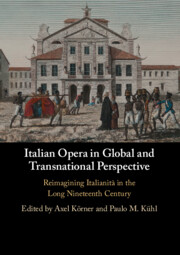 Italian Opera in Global and Transnational Perspective
Italian Opera in Global and Transnational Perspective In Search of Italianità in Early Japanese Opera History
Published online by Cambridge University Press: 17 March 2022
In the two decades between the first staging of Gluck’s Orfeo in 1903 and the end of Asakusa Opera in the great fire of 1923, musical theatre in Japan saw a rapid process of adoption and transformation. But despite the well-known role of Italian choreographer Giovanni Vittorio Rosi in the training and performance of Western opera at the Imperial Theatre in Tokyo, the association between opera and Italy that was so prominent in other parts of the world never quite took hold. The chapter interrogates the limits of the appeal of italianitá in the history of transnational operatic encounters. These limits are in part rooted in the general difficulties of transplanting a composite cultural form to a foreign setting and its hybridisation with local cultural practices. The chapter discusses the nation-building goals of the Meiji government and the translation of librettos, the Wagnerian moment among Japanese artists and intellectuals and the general conditions of cultural exchange in Meiji Japan and their effects on perceptions of Italianness.
To save this book to your Kindle, first ensure no-reply@cambridge.org is added to your Approved Personal Document E-mail List under your Personal Document Settings on the Manage Your Content and Devices page of your Amazon account. Then enter the ‘name’ part of your Kindle email address below. Find out more about saving to your Kindle.
Note you can select to save to either the @free.kindle.com or @kindle.com variations. ‘@free.kindle.com’ emails are free but can only be saved to your device when it is connected to wi-fi. ‘@kindle.com’ emails can be delivered even when you are not connected to wi-fi, but note that service fees apply.
Find out more about the Kindle Personal Document Service.
To save content items to your account, please confirm that you agree to abide by our usage policies. If this is the first time you use this feature, you will be asked to authorise Cambridge Core to connect with your account. Find out more about saving content to Dropbox.
To save content items to your account, please confirm that you agree to abide by our usage policies. If this is the first time you use this feature, you will be asked to authorise Cambridge Core to connect with your account. Find out more about saving content to Google Drive.